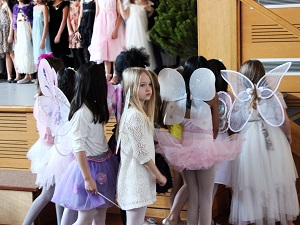Tiara Syndrome

Much has been made in the media of a so-called female phenomenon, the ‘Tiara Syndrome’. Originally coined by Carol Frohlinger and Deborah Kolb, the ‘Tiara Syndrome’ term refers to what seems to be a female tendency to work hard, to keep her head down and not to push herself forward for reward or recognition. We often see this in schools and at home with our own children; boys may push themselves forward to see what is happening; they often want to be the center of attention. Girls, however, tend to hold back and ‘get on with it’, believing that they will get what they deserve (i.e. the tiara) if they work hard. Girls, stereotypically, do not go out of their way to fight for recognition!
The syndrome is often seen as a reason why girls and, later, women do not seem to do as well in the workplace as men. Indeed, it was reported in 2012 that women occupy around only 30% of the most senior positions in the UK even though girls tend to do better in exams. Girls beat boys in the new grammar, punctuation and spelling test in this year’s Key Stage 2 Sats in England and, in this year’s GCSEs in England, Wales and Northern Ireland, girls achieved more A* and A grades.
Do girls hold themselves back too much? If so, what can we, as parents and teachers, do about it? How can we help girls to succeed and encourage girls to have the self-confidence not to want that tiara?
 Firstly, perhaps we should not worry! After all, we should encourage our daughters and the girls in our classrooms to seek success through hard work. Recently in our school’s ‘thought for the week’, we reflected on Colin Powell’s view that “a dream doesn’t become reality through magic; it takes sweat, determination and hard work.” We teach our daughters that hard work pays off in the end; success – in whatever form – will result from her determination.
Firstly, perhaps we should not worry! After all, we should encourage our daughters and the girls in our classrooms to seek success through hard work. Recently in our school’s ‘thought for the week’, we reflected on Colin Powell’s view that “a dream doesn’t become reality through magic; it takes sweat, determination and hard work.” We teach our daughters that hard work pays off in the end; success – in whatever form – will result from her determination.
Secondly, should we do more to help girls celebrate their successes, no matter how small? I believe that we should. We should encourage girls to talk openly about what they enjoy doing and the satisfaction they feel from doing well; whether this is scoring full marks in a spelling test, or handing a piece of difficult Science homework in on time, we need to celebrate these successes and encourage girls to feel proud of their achievements.
Thirdly, we should be open about the possibility of failure and the good that can be learned from it. Often, it is out of failure that come our greatest feelings of satisfaction. Encouraging the positive in such situations is crucial in helping girls develop their own self-esteem, something which becomes increasingly important as girls approach those teenage years. Focusing solely on the question a girl got wrong rather than those she got right can badly affect a girl’s confidence. Encouraging a positive outlook can make all the difference to a girl’s attitude towards herself and, therefore, to her future success.
Fourthly, we should reward success in all situations. The extra-curricular life of a child can be just as fulfilling as the success she has in the classroom. Praising a girl for scoring a goal in hockey, passing her first music examination, playing her first game of netball or just trying her best should all provide opportunities to praise. The education of the whole child is so important. As she grows older, a girl should feel that she has the confidence to succeed in all contexts and can, as a result, balance her work life with her home life; a skill that a woman needs as she faces the need to juggle the various demands she faces as an adult.
 Finally, we should encourage girls to be risk-takers. We should not encourage perfectionism but be happy when our daughters or the girls we teach have a go. Reinforcing key characteristics; perseverance and resilience; being willing to challenge herself and push herself out of her comfort zone is so important to the development of any child. The girl who looks at the climbing wall and says ‘let’s give it a go even though I might not reach the top!’ reflects the attitude we need to encourage in our daughters and in the girls we teach. Does it matter that she didn’t reach the top? No, as long as she was willing to have a go.
Finally, we should encourage girls to be risk-takers. We should not encourage perfectionism but be happy when our daughters or the girls we teach have a go. Reinforcing key characteristics; perseverance and resilience; being willing to challenge herself and push herself out of her comfort zone is so important to the development of any child. The girl who looks at the climbing wall and says ‘let’s give it a go even though I might not reach the top!’ reflects the attitude we need to encourage in our daughters and in the girls we teach. Does it matter that she didn’t reach the top? No, as long as she was willing to have a go.
Most of all, our role – whether as teacher or parent – is to be positive and to be concerned with the education of the whole child. Only then will a girl be able to embrace her successes and move forwards with confidence. At this point, a girl can step forward and remove her tiara!







